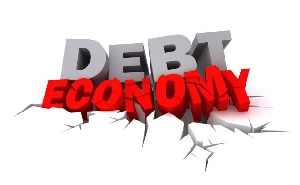As of March 31, 2020, total borrowing by Nigeria from China was US$ 3.121 billion, representing 3.94% of Nigeria’s total public debt of US$79.303 billion.
In terms of external sources of funds, loans from China accounted for 11.28% of external debt stock of US$27.67 billion. Recently, there were speculations that Nigeria was losing sovereignty to China over bad debts.
The Chinese embassy in Nigeria denied these allegations.
In recent times, more Africans have looked up to China for financial and technical support to rapidly boost financial infrastructural development.
Countries such as Ghana and Kenya have all benefited from China’s support. Some scholars describe China’s move in Africa as ‘debt trap diplomacy’.
The so-called China debt trap policy is often described as a long-term goal to entrap African nations into debt they cannot fulfil, and use that as a basis to obtain key resources or assets.
Where is the debt problem?
“Africa does not have a debt problem with China”, Eric Olander of China Africa project, said at Quartz Africa virtual event on Thursday, discussing China’s influence in Africa on the global economy.
Eric also stated that about 10 African countries have a debt problem with China meaning the majority are not. This makes Africa’s debt to China somewhat overblown.
However, Lee Jones and Shahar Hameri have debunked ‘debt trap policy’ as a myth. Citing Sri Lanka as an example, they point out that Sri Lanka’s debt distress arose not from Chinese lending but excessive borrowing from Western-dominated capital markets.
Data from Rhodium Group, a New York-based economic and policy research firm, suggests that “we continue to find very limited evidence that China’s policy banks have wiped away bilateral debt in exchange for control of strategic assets,” they said on their website.
This was based on over 130 cases from 2000 to 2020, regarding renegotiation involving China.
So far this year China has engaged in debt renegotiations with 15 countries globally with African countries making half of those. Angola being given a 3-year deferral on principal payments of its debt is a clear example of China’s renegotiation stance this year.
“It really highlights the fact that they are not pursuing this debt trap strategy that others are worried about,” Olander said.
External rivalries and reactions
Over the years there have been growing concerns in the White House over the China-Africa relationship.
The Trump White House has put it under a harsher negative spotlight. The US over the past decade has lost grounds to China on the African continent, fostering fears of China’s motive in Africa has become a reflex reaction.
Former US Secretary of State Rex Tillerson visited Africa in March 2018 with the aim of analyzing the dangers of China’s relationship with Africa. His successor Mike Pompeo also visited 3 African countries with China’s influence in Africa as his main focus.
Some of the problems are rooted in the Opacity of China’s dealings with Africa. Financial details and terms of its loans and commitment to the government on the continent typically remain vague, resulting in a huge vacuum of information to exist with stakeholders on both sides typically unwilling to be upfront about the dealings.
“We always place the burden of transparency on the Chinese side and yet it takes two to tango”, Olander said. We must remember transparency involves both China and African countries.
Does China really take advantage of loans to seize African countries’ assets or it is a myth?
Business News of Sunday, 25 October 2020
Source: africansonchina.com













